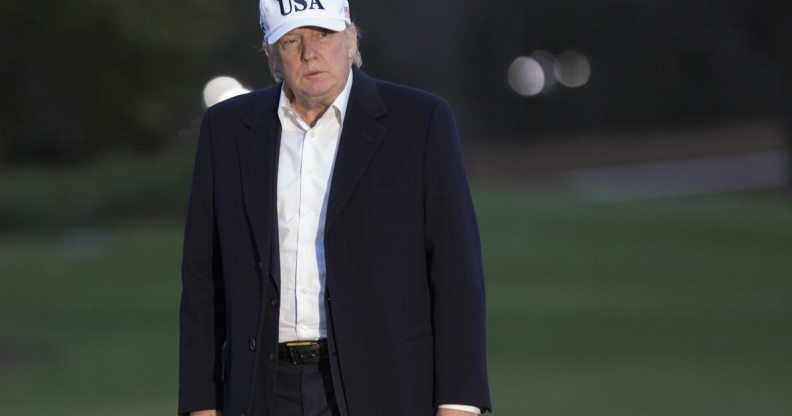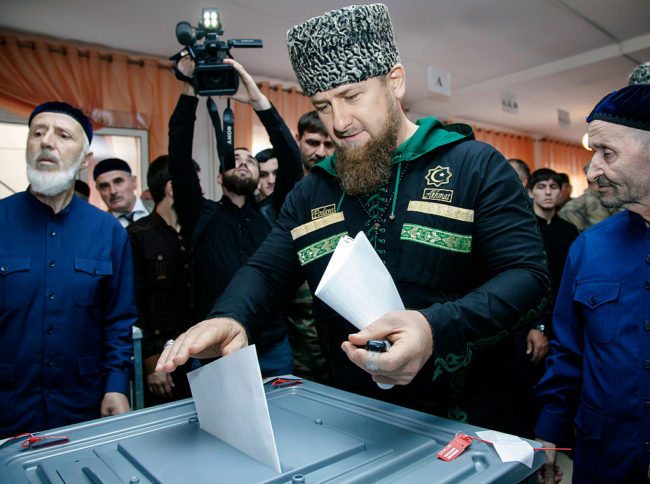The key moments and most disappointing stories of 2017

(Getty)
As 2017 draws to a close, PinkNews looks back at some of the most disappointing, and significant moments for LGBT people in the past 12 months.
Please be aware that some of the articles featured below may be unsuitable for some readers
1. Chechnya opens concentration camps for gay and bi men

(Getty)
In February media reports out of Chechnya found that gay and bisexual men had been rounded up and that concentration camp-style prisons were set up to house them as they were tortured and killed.
Novaya Gazeta, a newspaper based in the region, has on a number of occasions published the list of names it says President Ramzan Kadyrov’s government killed.

(Getty)
The President has denied that gay and bisexual people even exist in Chechnya, and has refused to bow to pressure from the international community around the purge.
Countries like Canada offered asylum to gay and bisexual men able to flee the country to freedom.
But it is likely that the camps are still in operation and that gay and bisexual men are still being detained and tortured. It has also become increasingly clear that dozens of gay and bi men have been killed amidst the ‘purge’.
2. Trans woman pleads for her life before being beaten to death
In one of the most shocking and harrowing stories published by PinkNews this year, a transgender woman was filmed pleading for her life just minutes before being beaten to death.
Dandara dos Santos, 42, was taken from her home, beaten, stripped and thrown in a wheelbarrow before being taken away to be killed.
The gang of six men who attacked her laughed and cheered as they kicked, punched and beat her with shoes and plank of wood.
The terrified woman, who lived in Fortaleza in northeastern Brazil, is seen in a video wiping blood from her face and body in the video while pleading with her attackers to stop.
The men taunt her about her breasts and throw transphobic and homophobic insults at her, telling her in Portuguese that they “will kill the faggot”.
LGBT groups started spreading the video online – a move which police have said helped them to discover who the attackers were.
Although Brazil legalised same-sex marriage in 2013 and hosts the world’s largest Pride celebration, LGBT attacks are upsettingly common.
3. Donald Trump becomes the first US President to speak at anti-LGBT hate group

Getty
In his first year as President, Donald Trump in October addressed the conference of a recognised anti-LGBT hate group.
The US president spoke at an event hosted by the Family Research Council (FRC), which is classed as a hate group for its strongly anti-LGBT agenda.
Trump addressed the group’s controversial Values Voters Summit in Washington, DC.
White supremacists, far-right activists and religious extremists were among the event’s attendees.
4. Donald Trump bans trans people from the military

(Getty)
Another story about Trump in a string of anti-LGBT sentiments, instructions and appointments, Trump continually attempted to ban transgender people from serving in the military.
Most recently, three former senior US military chiefs contradicted the Trump administration’s claims in a battle over transgender soldiers.
As a January 1 deadline approaches for the military to begin to accept transgender troops under an Obama-era directive, the Trump administration has been to court to seek to push back the deadline and continue its policy of banning them.

(Getty Images)
The administration has been seeking an emergency stay to block the deadline, claiming that accepting transgender people would involve a massive bureaucratic burden and that 23,000 staff would need in-depth training on transgender issues.
However, the claim has been rubbished in a document published by three former military chiefs.
Trump announced on Twitter earlier this year that all transgender servicepeople would be banned from the US armed forces, claiming they were a burden on the military.
However, the ban was quickly quashed by courts after a string of legal battles.
5. Australia legalises same-sex marriage after historic vote

Getty
The first same-sex weddings took place in late December, following a historic public vote on same-sex marriage and it being legalised in Parliament within a few weeks.
Royal Assent was given to the same-sex marriage law on 8 December following on from a historic postal vote earlier this year which saw more than 61 percent of Australians vote Yes for same-sex marriage.
Despite a 30-day waiting period after couples registered to marry, several weddings have already taken place because of special circumstances.

Getty
Because the country has a month-long notice period for couples waiting to marry, the majority of the first same-sex unions will not be able to begin until January 9 – one month from the date of the law coming into effect.
Australia’s parliament earlier this year legalised same-sex marriage, passing a bill to allow two people, regardless of sex, to marry.
The motion was approved almost unanimously by the House of Representatives, after passing the upper chamber the previous week.
6. The US votes against banning the death penalty for gay people

Getty
The US government insisted it agrees with abolishing the death penalty for homosexuality, despite voting against a United Nations resolution on the issue.
The US sided with Egypt, Saudia Arabia and Iraq in voting against a measure at the United Nations Human Rights Council that condemned the imposition of the death penalty for homosexuality.
The motion, which passed despite the US opposition, condemned the use of the death penalty “arbitrarily or in a discriminatory manner”, including for homosexuality.
It called for the death penalty to be banned “as a sanction for specific forms of conduct, such as apostasy, blasphemy, adultery and consensual same-sex relations”, as well as criticising its use on minors, mentally ill people and pregnant women.
7. Teen Vogue publishes controversial anal sex guide

In what sounds like pretty trivial news, Teen Vogue published an anal sex guide for its readers, and the reaction showed just how far we still have to go in the fight for equality and sexual liberation.
The magazine poked a lot of ultra-conservative, backwards-facing bears when it published a guide to anal sex in the summer.
Whether they didn’t know or didn’t care, the response to the article by sex educator Gigi Engle was unbridled fury from Christian Puritans.

The guide, which was aimed at “teens, beginners, and all inquisitive folk”, included a strong emphasis on how to have safe, pain-free and consensual sex.
It included information for those with and without prostates, and also put a strong emphasis on a need for “enthusiastic consent” and condom usage.
Nevertheless, it was torn apart by evangelicals – literally, in at least one case.
Elizabeth Johnston, a Christian mother who has a large social media following as ‘The Activist Mommy’, ripped and burned a copy of the magazine.
But it was also defended for enlightening readers on safe sex practices, consent and pain-free sexual enjoyment.
8. Bermuda legalises then bans same-sex marriage

Winston and Greg
Just six months after legalising same-sex marriage, Bermuda moved to abolish it.
A bill to introduce domestic partnerships was approved without amendment in December and replaced same-sex marriage with the partnerships.
It was approved with 24 votes for and 10 against in the Bermuda House.
The Domestic Partnership Act 2017 replaced same-sex marriage with domestic partnerships.

The bill did not roll back same-sex marriages that have already taken place since same-sex marriage became legal six months ago following a Supreme Court ruling.
It did, however; affect cruise ships which had begun offering same-sex wedding ceremonies on board since the ruling.
A cruise liner in August began offering legal same-sex weddings at sea following the May ruling.
9. A 15-year-old trans boy killed himself after school ‘refused to use his name’

In awful, tragic news, a transgender teenage boy died by suicide this year after his school refused to accept his transition, an inquest heard.
Leo Etherington, 15, had attended Wycombe High School – a girls’ grammar school in High Wycombe, Buckinghamshire.
He had come out to his family, friends and teachers as a transgender man and begun presenting as male.
However, a coroner’s court heard that the school refused to refer to him by his new name, and told him they would not respect his transition until he turned 16.
He later took his own life in his bedroom at home in High Wycombe.
Incredibly, the school’s statement continued to refer to Leo by his dead name.
10. Germany legalises same-sex marriage after historic shift

(Getty)
German MPs back in June voted by a clear majority to legalise same-sex marriage.
After years of campaigning, things moved swiftly with a vote being announced, carried out and successfully passed in a matter of days.
Chancellor Angela Merkel gave her Christian Democratic Union party a free vote in the proposal put forward by the Social Democrats – though Mrs Merkel herself voted against the legislation.
The vote passed in the Bundestag by a clear majority.

(Getty)
393 members of parliament voted in favour of the bill, with 296 voting against and 4 abstentions.
Previously, same-sex couples could not get married but instead only enter into civil unions.
And same-sex couples married from 1 October as scenes of jubilation ensued.
11. Danica Roem and Andrea Jenkins elected to public office

(Photo: Youtube / Comedy Central)
Danica Roem made history in the US when she became the first transgender person elected to a state legislature in Virginia.
Earlier this year, the journalist and heavy metal vocalist triumphed over Bob Marshall, a 26-year incumbent who proposed legislation that would have restricted which bathrooms trans people could use.
Marshall also refused to debate Roem or refer to her as a woman during the campaign, calling her “him” on campaign flyers.

(Photo: Youtube / Comedy Central)
But her fans celebrated her victory, which came alongside Andrea Jenkins, who became the first trans woman of colour to be elected to any office in the US.

(YouTube/Victory Fund)
The Democrat won by a landslide, attracting more than 73% of the first-choice votes in Minneapolis’s Eighth Ward to give her a place on the City Council.
Jenkins, who was previously a senior policy aide to departing Council Vice President Elizabeth Glidden, beat three other candidates.
The history-maker, who has 25 years of public service, said during the campaign that her “vision for Minneapolis is to bring my commitment to leadership, access and equity for all people.”
Jenkins, a grandmother as well as an award-winning poet, writer and performer, said she knew “the power of being in the room.”
12. Prince Harry and Meghan Markle mark World AIDS Day in historic first

(Getty)
Last year the Prince made headlines by taking a HIV test himself in a Facebook Live video in an appeal for more people to get tested.
He also took an HIV test with popstar Rihanna to highlight the issue.
The Prince said of his mother: “She started very punchy [on AIDS].”
And shortly after getting engaged, it was announced that Prince Harry and Meghan Markle would make their first joint appearance at an event held by HIV charity Terrence Higgins Trust.

(Getty)
The British royal made global headlines when he announced his engagement to Ms Markle, an actress best known for appearing in US TV show Suits.
However, she will be leaving the Hollywood life behind her ahead of the pair’s wedding, and taking up royal engagements alongside her fiance.
Kensington Palace confirmed later that the pair would make their first joint appearance at a royal engagement World AIDS Day.
13. Egypt begins purge of LGBT people

(Getty)
Egypt’s authorities are deliberately fuelling a homophobic ‘moral panic’ in order to build support for a homophobic crackdown.
There has recently been a dramatic surge in arrests of gay people in Egypt, fuelled in part by the country’s media.
Sources on the ground have repeatedly raised the alarm about Egypt’s so-called ‘Public Morality Investigation Unit’, which actively targets the gay community with raids and entrapment.
The situation worsened in September this year, when the waving of a rainbow flag at a music concert was extensively derided in the press – leading to a dramatic crackdown.
A report released by the Egyptian Initiative for Personal Rights charts the horrific extent of the crisis.
It says: “The EIPR has observed an exponential increase in the number of individuals arrested because of their private sexual practices and/or sexual orientation.

(Getty)
“In what is now known as the as the Public Morality Investigation Unit’s campaign against LGBTQ individuals and men who have sex with men or those perceived as such.”
Data available up until March 2017 shows that arrests have drastically risen in the past few years.
EIPR estimates based on media monitoring that 232 people were arrested between the end of 2013 and March 2017.
Egypt is not the only country to have been ‘purging’ LGBT people – Indonesia and Malaysia have also been cracking down on LGBT people as well as Turkey.
If you have been affected by issues in this article, and live in the UK, call the Samaritans on 116 123. If you are a young person in the US in crisis, feeling suicidal, or in need of a safe and judgment-free place to talk, call the Trevor Lifeline now at 866-488-7386. If you are an adult in need of support in the US, please call the National Suicide Prevention Helpline on 1-800-273-8255. If you are in Australia, contact the Australian Samaritans.

